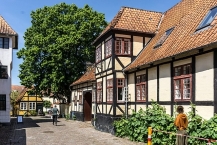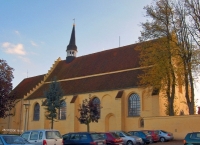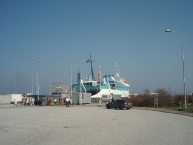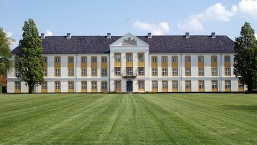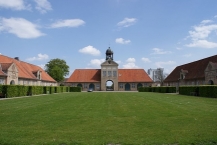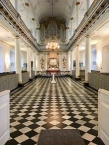Cycle Tour Bike holiday to Hamburg
Travel report: Faaborg-Flensburg-Rendsburg-Bad Bramstedt-Hamburg
Actions
![]()
Please wait - map data are loading
Added on 28 Jul 2018,
last edited by Ottocolor on 27 Aug 2018
Actions
Cycle route metrics
planned
ridden
Total distance in km
213
234
Cumulative elevation gain in m
1.923
1.911
Avg. slope uphill in %
0,90
0,82
Cumulative elevation loss in m
1.897
2.324
Information about rights to the gps-track data | |
|---|---|
Rights owner | |
Rights characteristic / license | cc0: Public Domain no Rights reserved |
Link to the description of the license | |
GPX file uploaded | by Ottocolor on 28 Jul 2018
|
Track points in total
2.801
3.049
Track points per km (avg)
11
13
Start/endpoint
Start location
Faaborg, Region of Southern Denmark, DK (0 m NHN)
End location
, Hamburg, DE (26 m NHN)
Character
Four days of bicycle holiday with myt son Alexander in August 2018, beginning in Faaborg on South Funen via the ferry of Boejden-Fynshav, Sonderborg, Flensburg and Rendsburg to Bad Bramstedt. From there by train to Hamburg. On the last day we visit the city and travel home by train.
Information about copyright | |
|---|---|
Rights characteristic / license | by-sa: CREATIVE COMMONS Attribution-ShareAlike |
Link to the description of the license | |
taken over / edited on | 28 Jul 2018
|
taken over / edited by |
|
Landscape
Hilly moraine landscape on South Funen, continuing on Als and beyond along Flensburg Fjord to Flensburg. All the way we follow the coast on the bike route along the fjord. In Kollund forest we go up steep slopes on gravel roads. The Danish-German border is crossed by Skomagerhus. One of Europe's and the world's most idyllic border crossings on a small wooden bridge over the Krus stream's mouth into the fjord. The landscape between Flensburg and Rendsburg is characterized by a more hilly moraine landscape, which rises to just under 200 meters above sea level in Hytten mountains, as they are called, south of Schleswig, but we avoid them. The old Danish town of Rendsburg is located in the Ejder valley, which is not particularly significant. This river is in its upper and middle run strongly influenced by adjustments and closures in favour of the Kiel Canal. This canal for seagoing ships intersects Schleswig-Holstein about where the dividing line between the two former Duchies lies, and since all bridges have to be very high, only a few of them exist and they all carry motorways or railways. Local traffic is accommodated by a large number of free ferries. South of the canal there are fewer hills, as it's more geest and heath plains, even far from the marshes and the North Sea. In Hamburg it's is again more hilly. A characteristic is the high bank down to the Elbe river, which creates beautiful viewpoints, so-called balconies, for example in Altona west of St. Pauli and Hamburg's Old Town. Here the high bank gradually decreases and flats out into wide marshlands east of the city.
Information about copyright | |
|---|---|
Rights characteristic / license | by-sa: CREATIVE COMMONS Attribution-ShareAlike |
Link to the description of the license | |
taken over / edited on | 06 Aug 2018
|
taken over / edited by |
|
Travel to and from ...
FIRST DAY, August 13, 2018
First stage in Alexanders and my bike trip to Hamburg. Corrected distance is 75.5 km (minus 14.4 km from the ferry crossing from Boejden to Fynshav). Our plan is to take Fynbus route 141 from OBC Nord, place H (in Dannebrogsgade opposite track 7/8) at 8.15. Arrival at Faaborg Gymnasium approximately at 9.10. That leaves us approx. 50 min. to cycle the 10.5 km to Bøjden, where the ferry to Als departs at 10:00. It can be made at an average speed of just over 13 km/h. 50 min. later we'll arrive at Fynshav on the island of Als. The distance from Fynshav to Flensbed hostel in Flensburg is 64 km. At an average speed of 11 km/h we'll arrive at 5 pm. At 6 pm. our tour at the Flensburg brewery right in the neighborhood starts.
SECOND DAY, 14 August, 2018
This day is dedicated to cycling from Flensburg to Rendsburg without using public transport. The route partially follows the old militæry route, which today is a signposted cycle route, eg. via Sankelmark (with the battlefield from 1864) and Suederschmedeby, bypassing Schleswig, close to Jagel Airport and through the village of Danewerk, on to Kropp and Fockbek and into Rendsburg.
THIRD DAY, 15 August, 2018
This day is dedicated to cycling on from Rendsborg with a look at the (temporarily) broken ferry, suspended in wires under the railway bridge over the Kiel Canal and crossing this with a (free) normal ferry that sails back and forth all the time. After that, the ox road route (as it is called in Germany) is abandoned and we cycle on minorl roads to Bad Bramstedt. From here commuter trains run to Hamburg Eidelstedt (AKN), departing at minute 58 with arrival at Hamburg Eidelstedt at minute 01 in the hour after. From this place we go by bicycle to our place of accommodation in Hamburg, St. Pauli Lodge. The corrected distance is 60.9 km. (minus 36,1 km on the train line). The guesthouse is located in St. Pauli's northern part near the Schanzenviertel, a modern style and alternative district, where a part is located in a disused industrial district, resembling to some extent the socalled meat town of Copenhagen.
FOURTH DAY, August 16, 2018.
The day is spent visiting Hamburg's sights, both near the lodge and inside the city center. Top possibilities include a harbor cruise and a visit to the plaza of the new concert hall of Elbphilharmoni. Using our bicycles, we are going to be fast and independent. At one point we have to go find the main train station in order to take the train home, IC 382 departing from Hamburg Hbf at 19.01, arriving at Fredericia at. 22.14 and onwards with R 3874 to Odense, depart. at 22.30, arriving at 23.19.
Stages
Information about copyright | |
|---|---|
Rights owner | |
Rights characteristic / license | by-sa: CREATIVE COMMONS Attribution-ShareAlike |
Link to the description of the license | |
Image has been uploaded | by Ottocolor on 31 Aug 2018
|
74 km
Faaborg-Flensburg
Information about copyright | |
|---|---|
Rights owner | |
Rights characteristic / license | by-sa: CREATIVE COMMONS Attribution-ShareAlike |
Link to the description of the license | |
Image has been uploaded | by Ottocolor on 31 Aug 2018
|
77 km
Flensburg-Rendsburg
Information about copyright | |
|---|---|
Rights owner | |
Rights characteristic / license | by-sa: CREATIVE COMMONS Attribution-ShareAlike |
Link to the description of the license | |
Image has been uploaded | by Ottocolor on 31 Aug 2018
|
66 km
Rendsburg-Bad Bramstedt-Hamburg
Information about copyright | |
|---|---|
Rights owner | |
Rights characteristic / license | by-sa: CREATIVE COMMONS Attribution-ShareAlike |
Link to the description of the license | |
Image has been uploaded | by Ottocolor on 31 Aug 2018
|
17 km
Hamburg
Beds4Cyclists, worth visiting and infrastructure
Name and address
Latitude / Longitude
Phone
Fax
Mobile
Type of accommodation
Rating for cyclists
Route km
Dist. to route
Elevation
0 km
0,1 km
17 m
Information about copyright | |
|---|---|
Rights owner | |
Rights characteristic / license | cc0: Public Domain no Rights reserved |
Link to the description of the license | |
Image taken over from | |
Image has been uploaded | by biroto-Redaktion on 08 Nov 2019
|
Information about copyright | |
|---|---|
Rights owner | |
Rights characteristic / license | by-sa: CREATIVE COMMONS Attribution-ShareAlike |
Link to the description of the license | |
Image taken over from | https://commons.wikimedia.org/wiki/File:Faaborg_-_half-timbered_house.jpg |
Image has been uploaded | by biroto-Redaktion on 08 Nov 2019
|
Information about copyright | |
|---|---|
Rights owner | |
Rights characteristic / license | cc0: Public Domain no Rights reserved |
Link to the description of the license | |
Image taken over from | https://commons.wikimedia.org/wiki/File:Faaborg_Vesterport.jpg |
Image has been uploaded | by biroto-Redaktion on 08 Nov 2019
|
Information about copyright | |
|---|---|
Rights owner | |
Rights characteristic / license | by-sa: CREATIVE COMMONS Attribution-ShareAlike |
Link to the description of the license | |
Image taken over from | https://commons.wikimedia.org/wiki/File:06-10-25-x6_Hellingåndskirken,_Faaborg_(Fyn).jpg |
Image has been uploaded | by biroto-Redaktion on 08 Nov 2019
|
Faaborg or Fåborg (Danish: [ˈfɒpɒːˀ]) is an old port town located on Faaborg Fjord in Faaborg-Midtfyn municipality on the island of Funen in Denmark. Faaborg has a population of 7,049 (1 January 2019). With its busy port, narrow streets and attractive old houses, the town is popular with tourists, particularly in the summer months. Faaborg was formerly the seat of Faaborg municipality. The seat of the new municipality is Ringe. Both municipalities use(d) Faaborg's medieval coat of arms.
See
The harbour, old streets, historic mansions and town houses all make Faaborg a pleasant city for visitors. Its many restaurants serve a wide variety of Danish and foreign dishes. Plougs Gård on Vestergade, built around 1790, is one of the finest buildings in the town with its Neoclassical facade. Jesper Ploug made his fortune in shipping during the American Wars of Independence (1776—1783)
Faaborg Church (Helligåndskirken) is an old monastery church dating from 1477. It formed the south wing of the now demolished Helligåndskloster belonging to the Order of the Holy Ghost from which it gets its name. Its considerable size makes it a local landmark: 46 m (151 ft) long by 19 m (62 ft) wide. The chancel and three-sided east gable were completed in 1490, the nave and southern aisle followed around 1510 and a northern aisle was added shortly thereafter. After its vaulting in 1681, it resembled a basilica. Restoration work was carried out in 1858 and 1902. The church has no tower but the tower of the now demolished Saint Nicholas Church (1450) serves as its belfry.
Faaborg Museum holds one of Denmark's most important art collections with works by the Funen Painters including Jens Birkholm, Peter Hansen, Johannes Larsen, and Anna and Fritz Syberg. It also displays some of the finest works of sculptor Kai Nielsen.Den gamle Gård on Holkegade provides insights into the town's cultural history, with exhibits depicting life in the 18th and 19th centuries.
Faaborg Harbour, with its centrally placed marina, attracts about 13,000 pleasure boats each year thanks to its attractive location for the South Funen Archipelago. It is frequently visited by vintage schooners and yachts of all sizes. The port is also used by fishing boats and commercial vessels.
Information about copyright | |
|---|---|
Rights characteristic / license | by-sa: CREATIVE COMMONS Attribution-ShareAlike |
Link to the description of the license | |
Input taken over from: |
Wikipedia contributors, 'Faaborg', Wikipedia, The Free Encyclopedia, 29 October 2019, 15:36 UTC, https://en.wikipedia.org/w/index.php?title=Faaborg&oldid=923598756 [accessed 8 November 2019] |
taken over / edited on | 08 Nov 2019
|
taken over / edited by |
|
12 km
0,0 km
0 m
Information about copyright | |
|---|---|
Rights owner | Nis Hoff |
Rights characteristic / license | by-sa: CREATIVE COMMONS Attribution-ShareAlike |
Link to the description of the license | |
Image taken over from | |
Image has been uploaded | by Ottocolor on 09 Apr 2013
|
Hours of opening
Afgangstider mandag-lørdag Bøjden-Fynshav:
Afgang hver hele ulige time fra kl. 05.00 til kl. 19.00, altså kl. 05.00, kl. 07.00, kl. 09.00, o.s.v. (januar 2013 - maj 2013)
Afgang hver hele time fra kl. 09.00 til kl. 17.00, altså kl. 09.00, kl. 10.00, kl. 11.00, o.s.v. Desuden afgang fra Bøjden kl. 05.00, kl. 07.00, kl. 19.00 og kl. 21.00 (1. juni 2013 - 31. august 2013)
Afgang hver hele ulige time fra kl. 05.00 til kl. 19.00, altså kl. 05.00, kl. 07.00, o.s.v. (september 2013 - december 2013)
Afgangstider søn- og helligdage Bøjden-Fynshav:
Afgang hver hele ulige time fra kl. 07.00 til kl. 21.00, altså kl. 07.00, kl. 09.00, kl. 11.00, o.s.v. (januar 2013 - maj 2013)
Afgang hver hele time fra kl. 09.00 til kl. 17.00, altså kl. 09.00, kl. 10.00, kl. 11.00, o.s.v. Desuden afgang fra Bøjden kl. 07.00, kl. 19.00 og kl. 21.00 (1. juni 2013 - 31. august 2013)
Afgang hver hele ulige time fra kl. 07.00 til kl. 21.00, altså kl. 07.00, kl. 09.00, o.s.v. (september 2013 - december 2013)
Highways.dk tager forbehold for ændrede afgangstider.
AlsFærgen: Bøjden - Fynshav
Sejltid: 50 minutter
Mødetid: Senest 15 minutter før afgang
38 km
3,1 km
14 m
Information about copyright | |
|---|---|
Rights owner | https://commons.wikimedia.org/w/index.php?title=User:PodracerHH |
Rights characteristic / license | cc0: Public Domain no Rights reserved |
Link to the description of the license | |
Image taken over from | https://commons.wikimedia.org/wiki/File:Augustenborg_Gartenfassade.JPG |
Image has been uploaded | by ThimbleU on 30 Sep 2019
|
Information about copyright | |
|---|---|
Rights owner | https://commons.wikimedia.org/w/index.php?title=User:PodracerHH |
Rights characteristic / license | cc0: Public Domain no Rights reserved |
Link to the description of the license | |
Image taken over from | https://commons.wikimedia.org/wiki/File:Augustenborg_Torhaus.JPG |
Image has been uploaded | by ThimbleU on 30 Sep 2019
|
Information about copyright | |
|---|---|
Rights owner | |
Rights characteristic / license | by-sa: CREATIVE COMMONS Attribution-ShareAlike |
Link to the description of the license | |
Image taken over from | https://commons.wikimedia.org/wiki/File:Augustenborg_Slotskirkes_kor.jpeg |
Image has been uploaded | by ThimbleU on 30 Sep 2019
|
Augustenborg Palace (or Augustenborg Castle; Danish: Augustenborg Slot, German: Schloss Augustenburg) is a Rococo-style palace in the southwestern part of Augustenborg , Als Island, Denmark, overlooking Augustenborg Fjord. The palace owes its name to Duchess Auguste (1633–1701). Augustenborg gave its name to the House of Schleswig-Holstein-Sonderburg-Augustenburg, the last member of which was Duke Christian August II (1798–1869).
History
The original half-timbered manor house was built in 1660-4 by Ernest Günther, the first Duke of Augustenborg, after he bought the village of Stavensbøl and demolished it for the land. The one-storey, red-roofed buildings around the outer courtyard were added from 1733 while the main three-winged building, replacing the original manor, was built from 1770 to 1776 in full symmetry, a fine example of Baroque architecture.
With its yellow-painted walls and blue-tiled roof, the wings gradually increase in height up to the central section. The three central bays of the facade protrude as an avant-corps three storeys high. Inside a beautiful entrance hall was finished in white-painted stucco by the Italian decorator Michel Angelo Taddei (1755–1831). Taddei also worked on the interior of the two-storey Baroque chapel in the building's northern wing, adding a Rococo altarpiece with an integrated pulpit as well as decorations along the vaults and walls of the nave. During the same period, much of the town was regenerated. The palace building underwent further renovation in the 1920s. Hans Christian Andersen spent two weeks at the palace in the autumn of 1844 and wrote The Little Match Girl when he visited the castle.
During the First Schleswig War (1848–50), Christian August II, the last duke to live in the palace, left Augustenborg as a result of his close relations with Germany. Thereafter the building was first used as a barracks and from 1878 as a seminary for women.
In 1921, Augustenborg was purchased by the Danish state. It was fitted out as a hospital in 1927–28 and since 1932 has been used as a psychiatric hospital. There is an exhibit about the palace, the town and its ducal history in the building's entryway.
Church
The largest room in the castle is the church hall, which dates from the late 18th century. Not visible from the outside, it covers the entire two-storey annexe of the north wing and is the successor of an older chapel, from 1671, which was demolished before the construction of the castle. The hall, which has served as the parish church of the town since 1874, was extensively restored in 1972.
The rococo architecture of the church hall is consistent with the rest of the building. The stucco work was probably designed by Michelangelo Taddei. The hall has seven divided window bays. Six Doric and six Corinthian columns separate the room, forming a three-aisled hall. A curved balustrade leads to the pulpit altar on the eastern wall. The organ is placed over the high altar and was built by the Holstein organ builder, Johann Daniel Busch. The Carrara marble baptismal font was a gift of the Russian Tsar Alexander I.
Information about copyright | |
|---|---|
Rights characteristic / license | by-sa: CREATIVE COMMONS Attribution-ShareAlike |
Link to the description of the license | |
Input taken over from: |
Wikipedia contributors, 'Augustenborg Palace', Wikipedia, The Free Encyclopedia, 27 September 2019, 06:06 UTC, https://en.wikipedia.org/w/index.php?title=Augustenborg_Palace&oldid=918135698 [accessed 30 September 2019] |
taken over / edited on | 30 Sep 2019
|
taken over / edited by |
|
42 km
2,1 km
13 m
43 km
3,3 km
9 m
![]()






